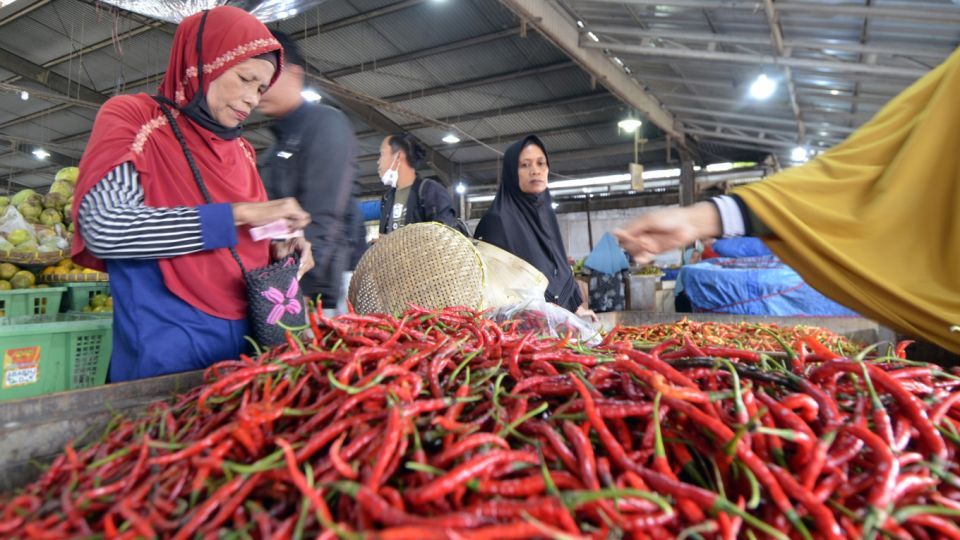November 2, 2022
JAKARTA – Inflation slowed in October following a drop in a wide range of food commodities, but analysts expect the drop to be temporary as risks overshadow the economy in the remaining weeks of the year.
The annual headline figure eased to 5.71 percent last month, down from the 5.95 percent year-on-year (yoy) recorded in September, according to Statistic Indonesia (BPS) data published on Tuesday.
The latest figure was well below projections of several analysts. State-owned lender Bank Mandiri and financial research-firm Moody’s Analytics, for instance, had expected a reading of 5.91 percent and 6.1 percent, respectively.
“Food prices have weakened, and that muffled inflation in October,” Setianto, undersecretary for distribution and services statistics at BPS, told reporters on Tuesday.
Many food commodities sold at lower prices in October compared to the previous month, with red chili peppers contributing most to the monthly deflation, followed by eggs, poultry, cayenne pepper and cooking oil. Meanwhile, prices of rice and tempeh remained on an upward trend.
The monthly price drop in the food category far outweighed the increase in the transportation category, and the overall monthly deflation seen in October muted annual inflation, BPS explained.
The cooling down of food prices last month saw the volatile food price inflation drop to 7.04 percent yoy from 9.02 percent yoy in the preceding month.
Meanwhile, administered price inflation, which measures government-mandated prices of goods such as most gasoline and other energy products sold at fixed prices, was unchanged at 13.28 percent yoy, reflecting the recent price hikes for subsidized fuel.
Core inflation, which excludes administered prices and volatile food prices, rose in October to 3.31 percent yoy from 3.21 percent yoy in September.
At that level, core inflation, which Bank Indonesia (BI) has described as central to its interest rate policy, remains far below the headline figure.
Indonesia has so far been spared the much-faster increase in consumer prices experienced in many developed economies, such as the United States, the European Union and the United Kingdom, which have seen double-digit inflation rates hit multi-decade highs.
The IMF has warned that policymakers in the EU will face tough policy choices to address both weak economic growth and high inflation. Meanwhile, analysts expect the US Federal Reserve (Fed) to deliver another massive interest rate hike on Wednesday in a bid to tame inflation, which would create pressure on other central banks to follow suit.
The fourth and final Finance Ministers and Central Bank Governors (FMCBG) Meeting under Indonesia’s Group of 20 leadership last month raised concern about the recession risk in many countries of the world.
Deputy Finance Minister Suahasil Nazara told reporters on Tuesday that the latest data would help the government keep inflation in check through this year.
On top of that, the government would continue to ensure the smooth production and distribution of food commodities in anticipation of the seasonal hike over the Christmas and New Year period, he said.
“For this year, we will do our best to keep annual headline inflation below 6 percent,” Suahasil said in the ministry’s office.
Bank Mandiri economist Faisal Rachman warned that annual inflation would remain high at least throughout the first half of next year, hovering between 5 and 6 percent.
For this year, the state-owned lender projects a rate of 6.27 percent, while the government has set a goal of ending the year with inflation no higher than 6 percent.
He attributed the risk to a second-round impact from the recent hike in subsidized fuel prices, meaning higher transportation costs would be passed through to prices of goods and services.
“This means both headline and core inflation could significantly heat up after the fuel price increase for the period ahead,” Faisal explained.
He said the government ought to anticipate the impact of a weakened exchange rate as central banks in many countries were aggressively normalizing their monetary policy, because a depreciated rupiah makes imported goods costlier, driving up what economists call imported inflation.
With inflation far above target and the threat of a further weakening exchange rate, Faisal expects BI to keep raising its benchmark interest rate to 5.5 percent through this year, up from the current level of 4.75 percent.
Bhima Yudhistira, executive director at Center of Economic and Law Studies (CELIOS), concurred that high inflation was likely to last until well into next year and would make Indonesians more cautious about their daily spending.
“Earnings of many Indonesians are unable to keep up with the rising prices. Therefore, there is a risk that it may slow down household spending,” Bhima told The Jakarta Post on Tuesday.
He implied this could impact GDP growth as private consumption accounts for more than half of the country’s gross domestic product, while weakening global economic growth may hit the country’s exports.
In light of the latest data, BI said on Tuesday that it expected full-year inflation to remain above its target range of 2 to 4 percent but come in much lower than previously expected.


